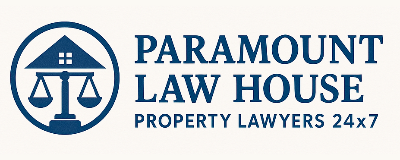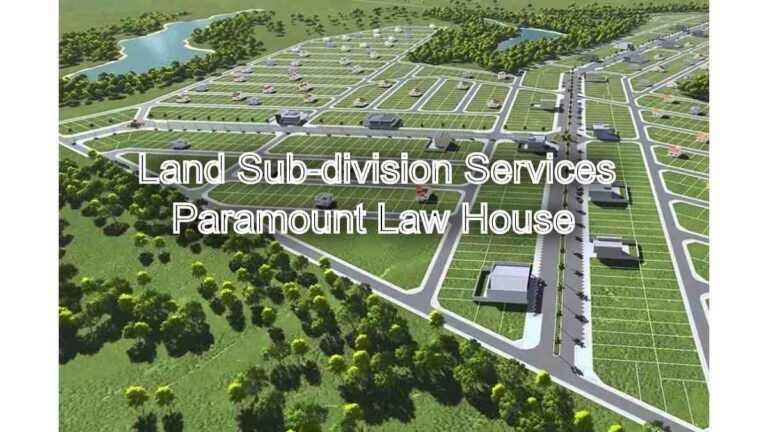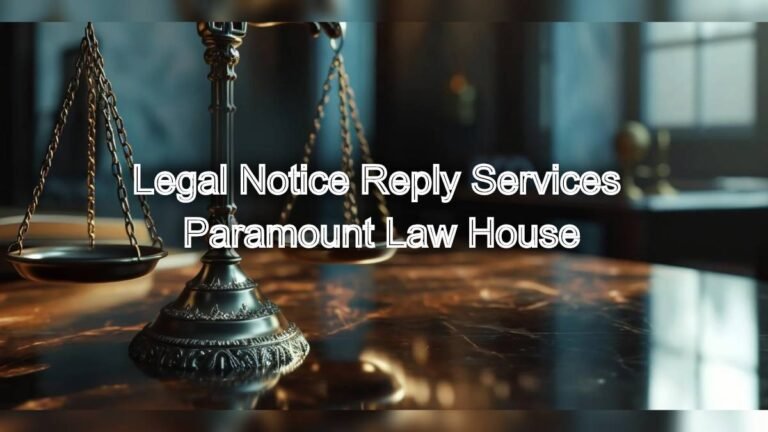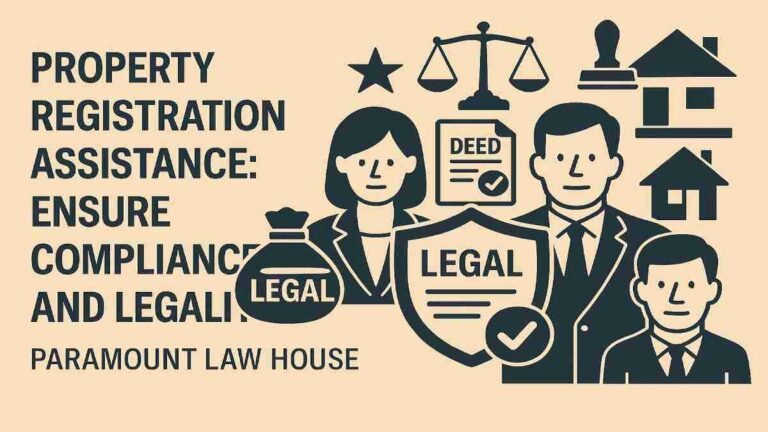Injunction Order Assistance: Protect Your Property Rights
Injunction Order Assistance: At Paramount Law House: Property Lawyers 24×7, we understand that your property rights are fundamental and deserve robust protection….
Injunction Order Assistance: At Paramount Law House: Property Lawyers 24×7, we understand that your property rights are fundamental and deserve robust protection. Disputes concerning land, buildings, or other immovable assets can be emotionally and financially draining. When your property rights are threatened or infringed upon, swift and decisive legal action is often necessary. One of the most powerful tools available to safeguard your interests is an injunction order. This article will delve into the intricacies of injunction orders. How Paramount Law House can provide you with expert assistance in securing and enforcing them.
Injunction Order Assistance: Protect Your Property Rights: Paramount Law House
Understanding the Essence of an Injunction Order
Injunction Order Assistance: In essence, an injunction order is a formal directive issued by a court of law. Compelling a party to either perform a specific act (mandatory injunction) . Refrain from performing a specific act (prohibitory injunction). In the context of property law, these orders are crucial in preventing irreparable harm to your property or your rights associated with it. For instance, if a neighbor unlawfully begins construction that encroaches upon your land. A prohibitory injunction can halt the construction immediately. Conversely, if someone is obligated to remove an obstruction from your property but fails to do so. A mandatory injunction can compel them to take the necessary action.
The Imperative Need for Legal Intervention
Injunction Order Assistance: Property disputes can manifest in various forms, ranging from boundary disagreements. Illegal possessions to unauthorized constructions and interference with easements. In such situations, waiting for lengthy legal proceedings to conclude can result in significant and irreversible damage to your property rights. Therefore, seeking immediate legal intervention to obtain an injunction order becomes paramount. This proactive approach can prevent further infringement and preserve the status quo until the court can adjudicate the matter definitively.
Grounds for Seeking an Injunction Order
Injunction Order Assistance: To successfully obtain an injunction order, you must demonstrate to the court that certain legal grounds exist. Primarily, the court will consider the following three crucial elements:
Firstly, you must establish a prima facie case, meaning that based on the available evidence. There is a strong likelihood that you possess the rights you are asserting. That there has been a violation or threatened violation of those rights. This involves presenting relevant documents, such as title deeds, survey reports, and any other evidence that substantiates your claim.
Secondly, you need to prove that if the injunction is not granted. You will suffer irreparable harm that cannot be adequately compensated by monetary damages alone. For example, if an illegal construction proceeds on your land. The permanent loss of that portion of your property constitutes irreparable harm. Similarly, if someone is obstructing your right of way. The inconvenience and potential loss of access cannot be easily quantified in monetary terms.
Thirdly, the balance of convenience must lie in your favor. This means that the potential hardship you would face if the injunction is not granted. Outweighs the potential hardship the opposing party would face if the injunction is granted. The court will weigh the competing interests of both parties to determine where the greater injustice lies.
Types of Injunction Orders in Property Law
In the realm of property law, several types of injunction orders can be sought, depending on the specific circumstances of the case.
Temporary Injunctions, also known as interim injunctions. Are granted for a limited period, typically until the final disposal of the suit or until a further order from the court. These are crucial in preventing immediate harm while the legal proceedings are ongoing. For example, if someone is attempting to forcibly take possession of your property. A temporary injunction can restrain them from doing so until the court can hear the matter in detail.
Permanent Injunctions, on the other hand, are granted after a full trial and permanently restrain the opposing party from performing a specific act or continuing a particular course of conduct. If you successfully prove your property rights and the infringement upon them, the court may issue a permanent injunction to prevent any future interference.
Furthermore, as mentioned earlier, mandatory injunctions compel a party to perform a specific act, such as removing an illegal structure or restoring access to a right of way. These are typically granted when a party has failed to fulfill a legal obligation that affects your property rights.
Conversely, prohibitory injunctions restrain a party from doing a specific act, such as continuing an illegal construction or trespassing on your property. These are the most common type of injunction sought in property disputes.
The Process of Obtaining an Injunction Order
The process of obtaining an injunction order generally involves the following steps:
Firstly, you will need to consult with experienced property lawyers, such as those at Paramount Law House. We will meticulously assess your situation, review all relevant documents, and advise you on the merits of your case.
Subsequently, we will prepare and file a plaint (the initial pleading in a lawsuit) along with an application for an injunction before the appropriate court. This application will detail the facts of your case, the legal grounds for seeking the injunction, and the specific relief you are seeking.
Thereafter, the court will typically issue a notice to the opposing party, requiring them to appear and respond to your application. In urgent situations where there is a risk of immediate and irreparable harm, the court may even grant an ex parte injunction, meaning an injunction granted without prior notice to the opposing party. However, such orders are usually temporary and the opposing party will be given an opportunity to be heard subsequently.
Following this, the court will hold a hearing where both parties will present their arguments and evidence. Your legal team at Paramount Law House will vigorously advocate for your rights, presenting a compelling case for the grant of the injunction.
Finally, after considering the evidence and arguments, the court will pass an order either granting or rejecting your application for an injunction. If the injunction is granted, it is crucial to ensure that the order is properly served on the opposing party and that they comply with its terms.
Why Choose Paramount Law House for Injunction Order Assistance?
At Paramount Law House: Property Lawyers 24×7, we possess the expertise and experience necessary to navigate the complexities of obtaining and enforcing injunction orders. Our team of dedicated property lawyers understands the nuances of property law and the urgency often associated with protecting your property rights.
Moreover, we provide round-the-clock legal assistance, ensuring that you can reach us whenever a property dispute arises, regardless of the time. This immediate availability can be critical in taking swift action to prevent further infringement of your rights.
Furthermore, we adopt a client-centric approach, taking the time to understand your specific situation and tailor our legal strategies to your unique needs. We will guide you through every step of the process, keeping you informed and empowered.
In addition to this, we have a proven track record of successfully securing injunction orders for our clients, protecting their valuable property interests. Our in-depth knowledge of relevant statutes, precedents, and court procedures ensures that your case is presented effectively and persuasively.
Besides our legal expertise, we also understand the emotional distress that property disputes can cause. Therefore, we provide compassionate and understanding support throughout the legal process, striving to alleviate your concerns and achieve the best possible outcome for you.
Enforcing an Injunction Order
Obtaining an injunction order is only the first step. Ensuring compliance with the order is equally important. If the opposing party violates the terms of the injunction, you have legal recourse to enforce it. This may involve filing a contempt of court petition, bringing the violation to the court’s attention. The court has the power to take action against the violating party, which may include imposing fines or even imprisonment in certain cases. Paramount Law House can also assist you in taking the necessary legal steps to enforce an injunction order and ensure that your property rights are respected.
Frequently asked questions with answers regarding injunction orders for property rights protection
A: An injunction order is a formal court directive compelling someone to either do (mandatory injunction) or stop doing (prohibitory injunction) a specific act related to a property. It’s used to prevent harm or enforce rights, like stopping illegal construction or ensuring access.
A: You should consider seeking an injunction when your property rights are being violated or are under immediate threat of violation, and this violation could cause irreparable harm that money alone cannot fix. Examples include encroachment, illegal construction, or obstruction of access.
A: The court primarily looks at three things: if you have a strong initial case (prima facie case), if you’ll suffer harm that can’t be reversed by money alone (irreparable harm), and if the inconvenience to you outweighs the inconvenience to the other party if the injunction is granted (balance of convenience).
A: A temporary injunction (or interim injunction) is granted for a limited time while the court reviews the case. A permanent injunction is issued after a full trial and permanently restricts the other party’s actions regarding the property.
A: If someone violates an injunction order, they can be held in contempt of court. This can lead to penalties like fines or even imprisonment. You would typically need to file a petition with the court to bring the violation to their attention for enforcement.
Conclusion: Securing Your Peace of Mind
In conclusion, an injunction order is an indispensable legal tool for safeguarding your property rights against infringement. It provides a mechanism for immediate intervention to prevent irreparable harm and preserve the status quo. At Paramount Law House: Property Lawyers 24×7, we are committed to providing you with comprehensive assistance in obtaining and enforcing injunction orders. Our experienced property lawyers are available around the clock to offer expert legal guidance and representation. Therefore, if you are facing a threat to your property rights, do not hesitate to contact us. We are here to protect your interests and help you secure your peace of mind. Remember, timely legal action is often the most effective way to protect your valuable property assets. Trust Paramount Law House to be your steadfast partner in safeguarding your property rights.






